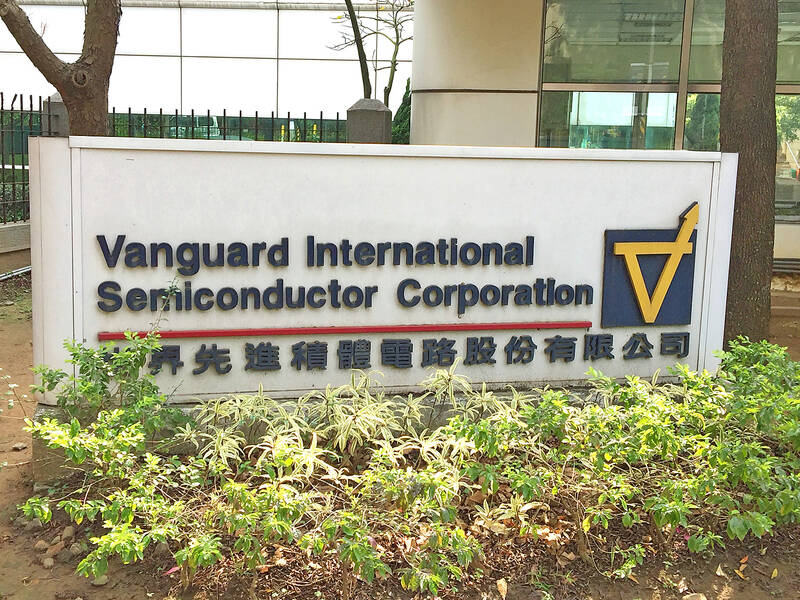Vanguard International Semiconductor Corp (世界先進), which makes power management chips and display driver chips, expects moderate sales growth this year, aided by healthy supply chain inventory and rising demand from China due to its economic stimulus measures.
“This year would be better than last year. On a sequential basis, we expect a gradual recovery each quarter following a similar pattern to last year,” Vanguard vice president Claire Chen (陳姿鈞) told a virtual investors’ conference yesterday.
Factory utilization would improve to between 70 and 80 percent this year, from 65 percent in the final quarter of last year, Vanguard said, without factoring in potential impact from the macro environment.

Photo: Grace Hung, Taipei Times
Vanguard expects direct impact from the US’ tariff policy would be “trivial” as only a tiny portion of its chips are shipped directly to the US, company chairman Fang Leuh (方略) said, adding that the company is not considering building a factory in the US.
However, its indirect impact on the entire semiconductor industry could be enormous, as potential US tariff hikes on electronics, high-tech products and vehicles would lead to a jump in inflation and electronics prices, he said.
That could weaken consumer spending and ultimately diminish US economic growth and semiconductor demand, he added.
Even so, Vanguard’s plan to build a 12-inch wafer fab in Singapore with NXP Semiconductor NV would proceed as scheduled, it said, adding that it would ramp up production in 2027.
To fund the fab’s construction, Vanguard plans to expand its capital expenditure this year to between NT$60 billion and NT$70 billion (US$1.83 billion to US$2.13 billion) compared with NT$15.94 billion last year.
This quarter, wafer shipments are forecast to expand between 8 and 10 percent sequentially, Vanguard president John Wei (尉濟時) said, attributing the growth to rising demand from China and customers’ requests to ship products ahead of schedule amid concern over US tariff hikes.
Vanguard would also recognize income from its long-term supply agreements, accounting for about 2 percent of its total revenue, Wei said.
Average selling prices are forecast to dip about 4 to 6 percent sequentially this quarter, he said.
Gross margin would improve to between 29 percent and 31 percent compared with 28.7 percent last quarter, while factory utilization rate would climb to between 70 and 75 percent from 65 percent a quarter earlier, he said.
Vanguard’s net income fell 4.4 percent to NT$7.05 billion last year, the weakest ever. Earnings per share dropped to NT$4.16 from NT$4.43.
The company’s board of directors approved a proposal to distribute cash dividends of NT$4.5 per common share, the same as last year, with the money coming from its reserve income.

Anna Bhobho, a 31-year-old housewife from rural Zimbabwe, was once a silent observer in her home, excluded from financial and family decisionmaking in the deeply patriarchal society. Today, she is a driver of change in her village, thanks to an electric tricycle she owns. In many parts of rural sub-Saharan Africa, women have long been excluded from mainstream economic activities such as operating public transportation. However, three-wheelers powered by green energy are reversing that trend, offering financial opportunities and a newfound sense of importance. “My husband now looks up to me to take care of a large chunk of expenses,

SECTOR LEADER: TSMC can increase capacity by as much as 20 percent or more in the advanced node part of the foundry market by 2030, an analyst said Taiwan Semiconductor Manufacturing Co (TSMC, 台積電) is expected to lead its peers in the advanced 2-nanometer process technology, despite competition from Samsung Electronics Co and Intel Corp, TrendForce Corp analyst Joanne Chiao (喬安) said. TSMC’s sophisticated products and its large production scale are expected to allow the company to continue dominating the global 2-nanometer process market this year, Chiao said. The world’s largest contract chipmaker is scheduled to begin mass production of chips made on the 2-nanometer process in its Hsinchu fab in the second half of this year. It would also hold a ceremony on Monday next week to

TECH CLUSTER: The US company’s new office is in the Shalun Smart Green Energy Science City, a new AI industry base and cybersecurity hub in southern Taiwan US chip designer Advanced Micro Devices Inc (AMD) yesterday launched an office in Tainan’s Gueiren District (歸仁), marking a significant milestone in the development of southern Taiwan’s artificial intelligence (AI) industry, the Tainan City Government said in a statement. AMD Taiwan general manager Vincent Chern (陳民皓) presided over the opening ceremony for the company’s new office at the Shalun Smart Green Energy Science City (沙崙智慧綠能科學城), a new AI industry base and cybersecurity hub in southern Taiwan. Facilities in the new office include an information processing center, and a research and development (R&D) center, the Tainan Economic Development Bureau said. The Ministry

Nvidia is to open a quantum computing research lab in Boston, where it plans to collaborate with scientists from Harvard University and the Massachusetts Institute of Technology, Nvidia CEO Jensen Huang (黃仁勳) said on Thursday. Huang made the announcement at Nvidia’s annual software developer conference in San Jose, California, where the company held a day of events focused on quantum computing. Nvidia added the program after Huang in January said that useful quantum computers are 20 years away, comments that he sought to walk back on Thursday while joined onstage by executives from quantum computing firms. “This is the first event in history